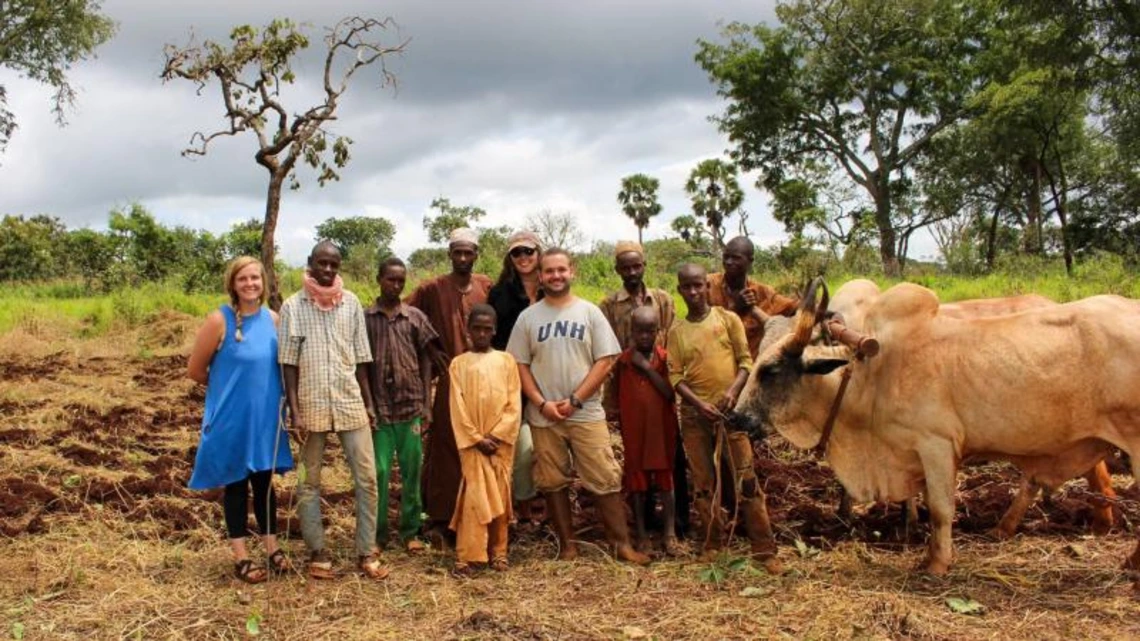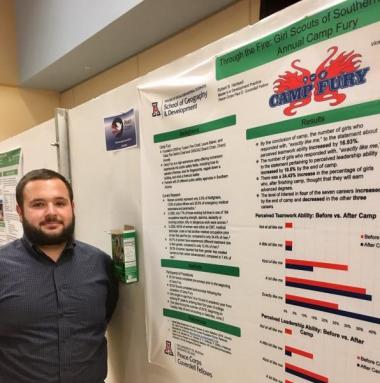Q&A with Robert Hartwell, MDP Student and Peace Corps Coverdell Fellow

Bobby, at center, wearing UNH t-shirt, with farmers in Cameroon who were ploughing their land to get it ready for corn season.
Robert Hartwell is a Coverdell Fellow in the UArizona Master’s in Development Practice (MDP) Program. Bobby served in the Peace Corps in Cameroon in West Africa from 2015 to 2017, and is currently president of the UA Peace Corps Club. The Coverdell Fellowship Program for Returned Peace Corps Volunteers (RPCVs) covers substantial portions of tuition through an outreach assistantship that places students with local agencies in Tucson.
What was a major highlight of your time in the Peace Corps in Cameroon?
When I look back on my PC service in Cameroon, the first memory that always comes to mind is from the Nyambaka Boys & Girls Club. My site-mate and I came up with the idea of having a "Gender Roles Reversal Day" and it was one of the most eye-opening, and comical, experiences that I had during my service.
During this activity, the goal was to put together a meal for all of us to share - but there was a twist. The female students took on the typical responsibilities of their male counterparts, and vice versa. This meant that the female students got to hangout and play football while the male students were responsible for preparing the meal. The result was simply incredible. The male students struggled to cook a meal while the female students thoroughly enjoyed their time off. Eventually, the female students decided to step in and help their male counterparts, but only because they were getting hungry.
With the meal finally cooked, my site-mate and I facilitated a discussion about what the group had just experienced. The male students shared that they were now more aware of how much work their female counterparts had to do and the female students voiced their appreciation in response. We not only achieved our goal of sharing a meal together but, more importantly, contested some of the common gender roles found throughout the village.
What was challenging about this was scaling these lessons up to reach the greater community. Gender roles and norms are not easy to reverse in a patriarchal society, especially within older populations. It took me quite some time to finally come to the conclusion that this probably wasn't going to be as successful outside of the high school. I believe that such challenge extends across most aspects of Peace Corps.
"I realized pretty early on in my post-Peace Corps career that I had a lot to learn if I wanted to continue working in the international development sector. I also realized that a Master's degree was almost necessary for the kinds of jobs that I was interested in."
What drew you to the Arizona MDP program?
What drew me to the MDP program at UArizona was its emphasis on an interdisciplinary approach to development. All of the different sectors, from health to agriculture to education to economics, are all connected in varying ways. I appreciated that the UArizona's MDP program valued the relationships between all of the development sectors.
Another thing that drew me to the MDP program at UArizona was the Peace Corps Coverdell Fellowship. Not only does it include one of the best financial packages, but it also has other factors that I deemed valuable as well. One of the requirements of the Coverdell Fellowship is the Outreach Assistantship - which I saw as an opportunity to work on the skills and tools that I hoped to utilize in my future career. I also really appreciated the Coverdell Fellowship's emphasis on community service. Having the opportunity to engage with the local community was something I thought was important - and it's something that I've grown to thoroughly enjoy during my time here.
Your Coverdell Fellowship includes an outreach assistantship and participation in the on-campus RPCV community. What has that been like?

During my first year, I worked for Girl Scouts of Southern Arizona as a Monitoring, Evaluation, Accountability, & Learning (MEAL) Fellow. My supervisor, the former Vice President of Systems & Evaluations, was incredibly knowledgeable about the field of monitoring and evaluation and was just as eager to learn from me as I was eager to learn from her. During my time there, I evaluated a number of Girl Scouts summer camps and other social impact programs.
However, what I am most proud of is the work I did for Girl Scout's Camp Fury. Camp Fury was developed to introduce local girls to a career in firefighting and public safety while encouraging leadership and physical fitness, and it was my job to conduct a thorough evaluation of its impact on the girls who participated in it. The results of my evaluation influenced future programming and the poster based on the research also was awarded 1st place at UArizona's Peace Corps Coverdell Outreach & Research Showcase in February 2019 (see photo at right).
For my second year I decided to continue working in the youth development sector, this time with Big Brothers Big Sisters of Southern Arizona. My experience during this second year has been much different than the year prior. I've been responsible for conducting an evaluation of their Mentor2.0 program - a high school mentoring program dedicated to youth development through relationship building, career planning and goal setting, and life skills development for at-risk youths. At Girl Scouts, I was mostly responsible for analyzing data that had already been collected. Now, at Big Brothers Big Sisters, I have been responsible for the entire evaluation process - from planning to implementing to analyzing. It has definitely been challenging, but I believe it has prepared me for leadership roles moving forward.
"Coming into the MDP program as a Coverdell Fellow, the Outreach Assistantship was something I really looked forward to. I saw it as chance to put my skills to use, while also learning from those who were more experienced in my area of interest."

